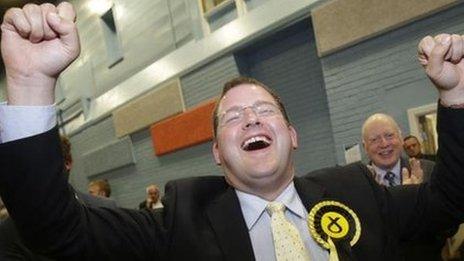Mark McDonald's whirlwind political career
- Published
Mark Mcdonald: "My behaviour coach has helped me better understand how aspects of my behaviour might be seen by others."
Former childcare minister Mark McDonald's was the surprise winner of a seat to Holyrood in 2011. He was steadily climbing the ranks of government when his progress came to an abrupt halt following allegations of inappropriate behaviour. Mr McDonald has now quit the SNP although he remains the independent MSP for Aberdeen Donside.

The 37-year-old was born and raised in North East Scotland, hailing from Inverurie.
After studying politics and strategy at university in Dundee and Aberdeen, he entered politics in 2003, working as a parliamentary assistant to a group of North East MSPs.
He was elected to Aberdeen City Council four years later, and despite being just 26 at the time became deputy leader of the SNP group on the council.
After an unsuccessful bid to win election to Westminster in 2010, where he finished fourth in the Aberdeen South race, Mr McDonald was elected to Holyrood as a regional MSP in 2011.
His arrival at the Scottish Parliament was part of Alex Salmond's unprecedented landslide victory, which saw the SNP effectively break the system to secure a majority by capturing both constituency and regional top-up seats.
Mr McDonald's election was unexpected - with the SNP winning all ten constituency seats in the area, the additional member system should have made it impossible for them to pick up extras from the list, but for the sheer volume of votes.
The councillor was fifth on the list and actually turned up to the election count in Aberdeen wearing jeans and a t-shirt, but found himself elected after all of the list candidates ahead of him won constituency seats.
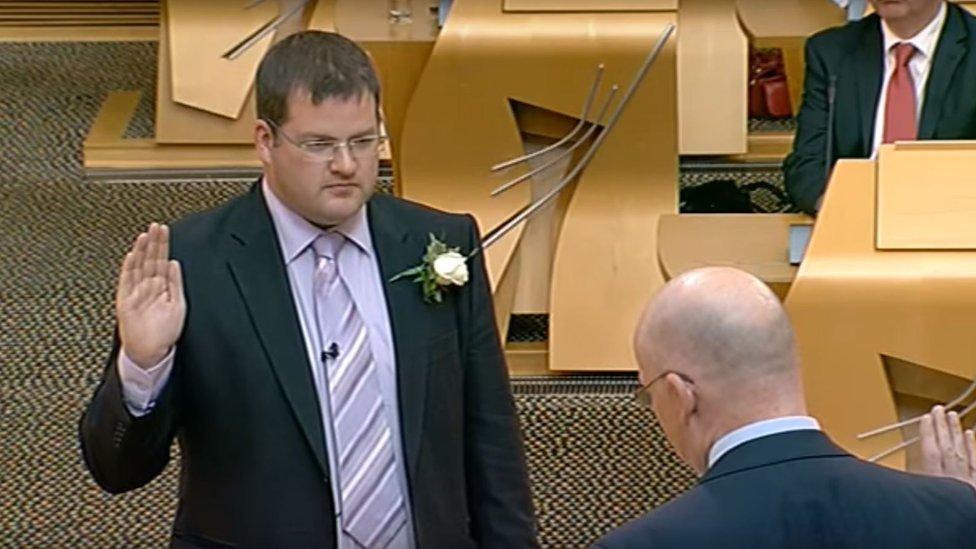
Mark McDonald was initially sworn in as a list MSP, but soon won a constituency seat
He wasn't a list MSP for long.
SNP colleague Brian Adam, who had served as an MSP since the inception of the Scottish Parliament in 1999, lost his battle with cancer in April 2013.
Mr McDonald was selected as the SNP candidate to fight the Aberdeen Donside by-election. He had to quit his list seat to do so, although the SNP were guaranteed to keep it in any case.
In the end they were also destined to keep the constituency seat, with Mr McDonald winning fairly comfortably - although the SNP majority in the area was cut from more than 7,000 to just over 2,000 on the night.
Other candidates in the ballot included Lib Dem Christine Jardine and Tory Ross Thomson, both of whom are now MPs, but it was longstanding Labour councillor Willie Young who came closest to an upset.
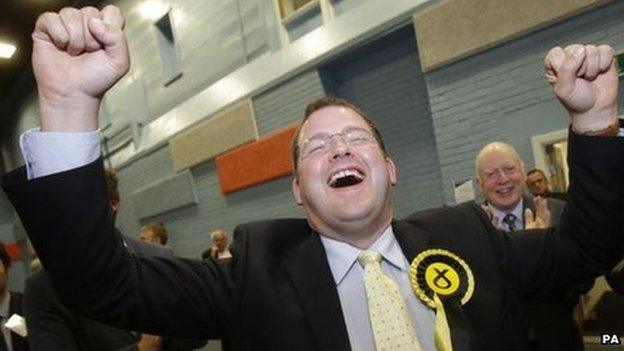
Mark McDonald saw off eight other candidates to win the Aberdeen Donside by-election
As a backbench MSP, Mr McDonald served on a number of committees, and was a parliamentary assistant both to Mr Salmond and Deputy First Minister John Swinney.
He frequently championed better support for people with autism, and also managed to pass a member's bill to tackle disputes over high hedges.
In the 2016 election, Mr McDonald held his seat with a majority of 11,630 votes - the biggest numerical margin in the country, and the eighth largest by percentage of the vote, making Aberdeen Donside one of the safest seats in Scotland.
First Minister Nicola Sturgeon appointed him a junior minister following the election, working under Mr Swinney again as minister for childcare and early years.
During his time in this job, he was central to the rollout of the government's baby box scheme and Ms Sturgeon's flagship pledge to double the number of hours of free childcare available to Scottish parents.
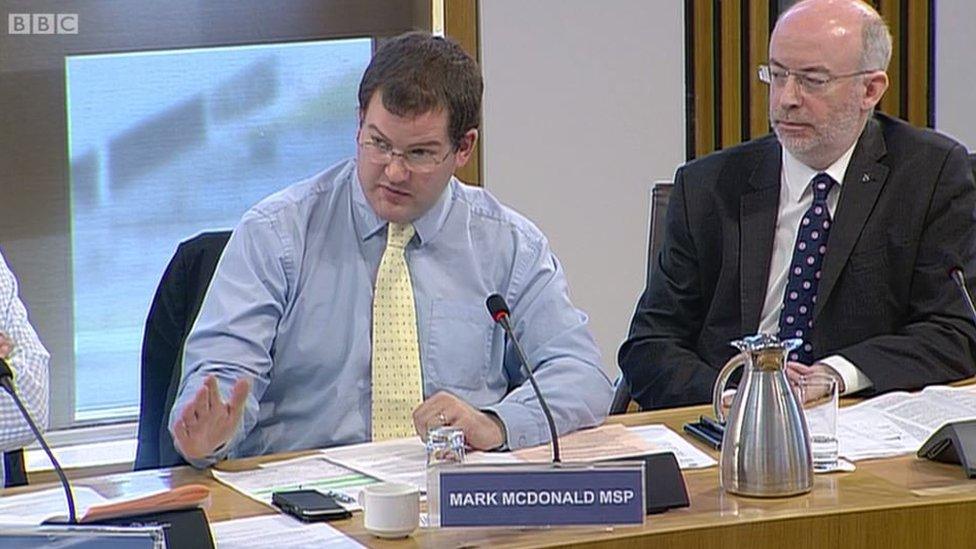
Mr McDonald served on a number of committees while he was a backbench MSP
In November 2017, the MSP quit his ministerial role after reports he had sent a text message to a woman containing a reference to a sex act - the latest entry in a growing furore about sexual harassment and inappropriate behaviour in politics.
In a statement, he said: "It has been brought to my attention that some of my previous actions have been considered to be inappropriate - where I have believed myself to have been merely humorous or attempting to be friendly, my behaviour might have made others uncomfortable or led them to question my intentions."
Initially, he was backed by the government, and his party. A spokesman for Ms Sturgeon said it was right for Mr McDonald to apologise and recognise that "in his current role it would be inappropriate for him to remain in government".
However, they stressed that he would "continue to make a valuable contribution to parliament" as an MSP, saying it was "to Mark's credit" that he had taken responsibility for his behaviour.
'I've asked for the chance to change'
Over a week later, Mr McDonald made a further statement on the matter, saying his actions had caused "considerable distress and upset", and said he had agreed to seek professional "support".
But days after this, the 37-year-old was suspended by the SNP after "new information" emerged about his conduct. He was axed from both the parliamentary group and the party itself, leaving him sitting as an independent MSP - although he was never seen at Holyrood again.
Even in his absence he managed to find himself at the centre of another outcry, after it emerged he was in line for a payoff for leaving his ministerial role.
The £7,270 "resettlement grant" was automatically triggered 90 days after his resignation under the Scottish Parliamentary Pensions Act 2009, but opposition members said it was "clearly wrong" that a payment should be made to Mr McDonald "considering the circumstances of his departure".
The SNP's probe into the matter dragged on for more than three months - with Transport Minister Humza Yousaf conceding in February that it was "perhaps taking more time than it should".
Mr McDonald himself said he was not informed of the allegations made against him for almost two months, and even as he resigned from the SNP said he had only been allowed to read the investigation report and was not given a copy.
He said that his "behaviour towards two individuals fell below the level of professionalism that they were entitled to expect".
However he said he would return to Holyrood as an independent member after taking some time with his family.
- Published6 March 2018
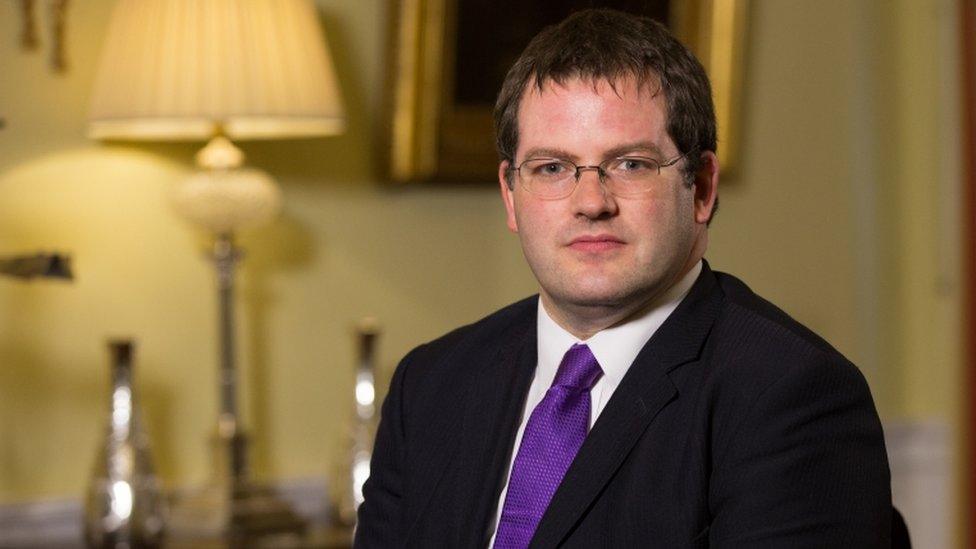
- Published16 November 2017
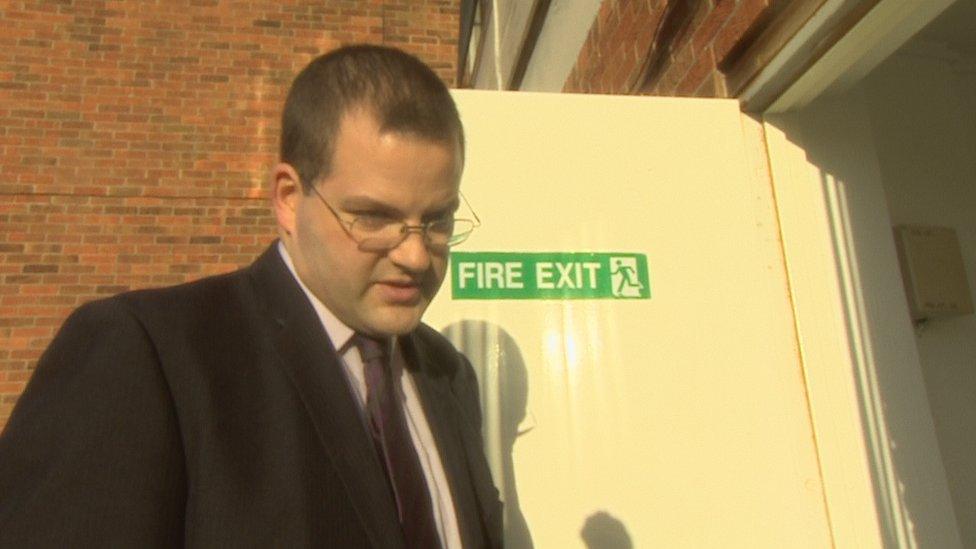
- Published21 June 2013
